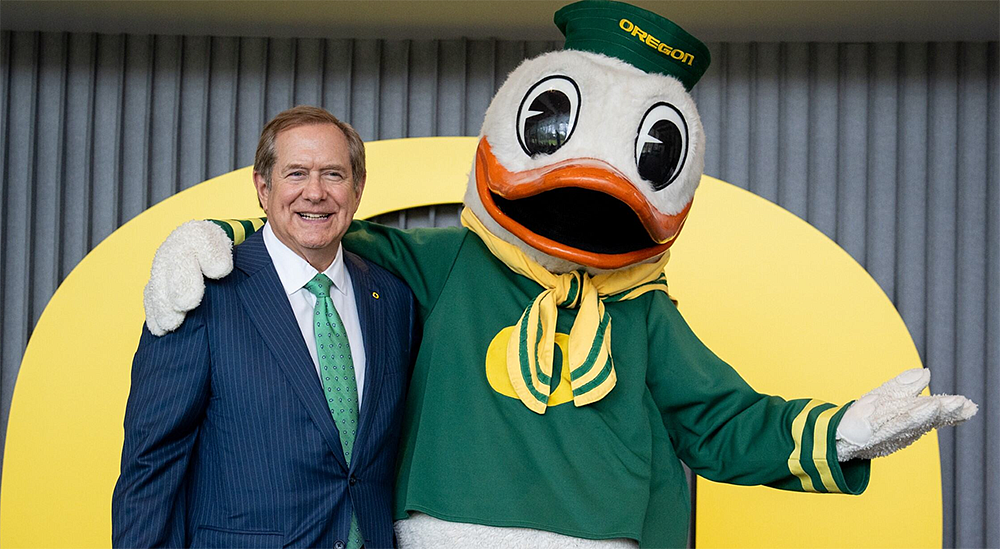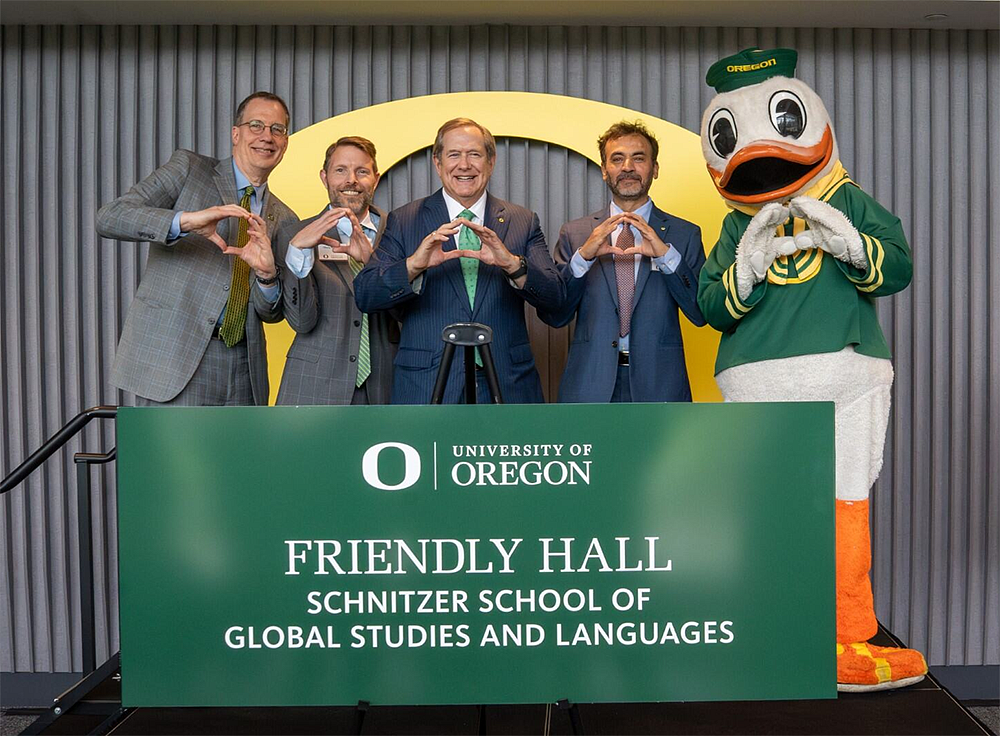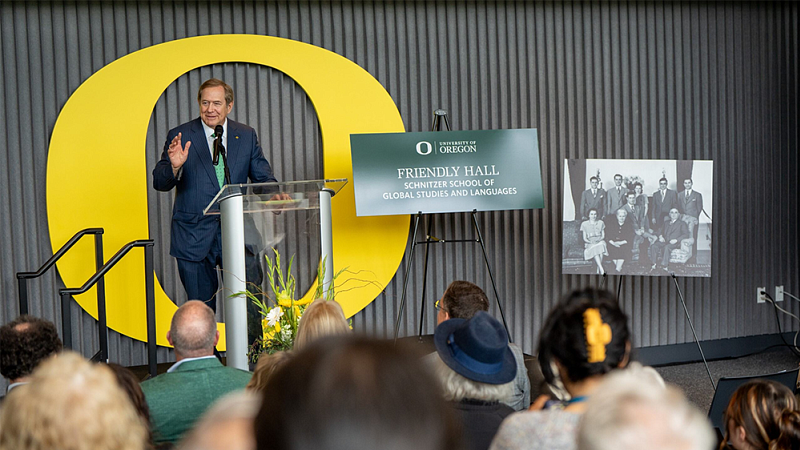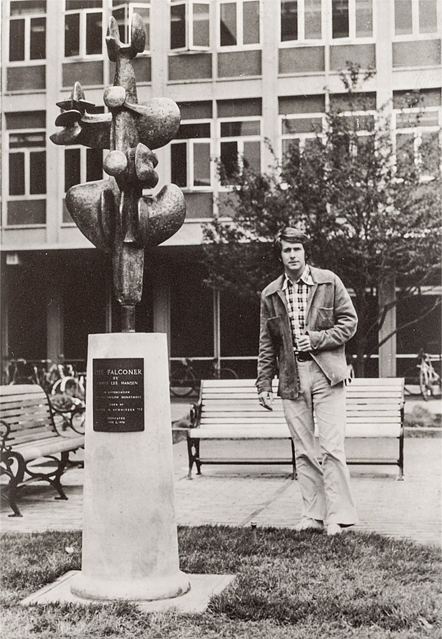
Experiential Learning | Research & Innovation | Community Impact | Career Preparation | Teaching Excellence | 21st Century Liberal Arts | Building Community | Good Vibes | CAS Spotlights | All Stories | Past Issues

Expanding Our Global Reach
BY JENNY BROOKS AND HENRY HOUSTON
JUNE 9, 2025
The world is more interconnected than ever. In an instant, we can build a relationship with someone on the other side of the world. Many of our consumer goods are created and manufactured along a supply chain that spans several thousand miles in dozens of countries. We can travel to just about any place in the world with ease.
And there’s no stopping the growing world from getting even smaller.
In today’s global world, a landmark $25 million commitment from Jordan Schnitzer and the Harold & Arlene Schnitzer CARE Foundation is an investment to make the University of Oregon College of Arts and Sciences a place that inspires the next generation to tackle the world’s pressing challenges. The gift, Schnitzer says, is one he proudly makes in honor of his parents’ estate.
Schnitzer is a Portland real estate developer, philanthropist and UO alumnus. Since he was 14 years old, he has worked for the family business, Schnitzer Properties. Throughout his time as a businessman based in Oregon, he says he’s seen how global forces impact businesses like his and how important it is to be prepared.

But an education on global issues, languages and cultures isn’t just something to sharpen a resume. Schnitzer says a global education improves business interactions, fosters a healthier perspective of oneself, and highlights the importance of preserving our world.
“There's a competitiveness today, and the University of Oregon has to respond to the changing needs of the marketplace,” Schnitzer says. “What's exciting about this program is Aneesh Aneesh, the Dean and his team of professors get to shake up higher education.”
Schnitzer hopes his family’s gift inspires students to go into politics, influence meaningful policies, and work for international organizations and corporations to make a positive change around the world. “I hope people say, ‘I want to do something where I wake up every day in some yet-to-be-determined career where I’m making a difference.’”
In recognition of the largest gift ever made to CAS, the School of Global Studies and Languages is now called the Schnitzer School of Global Studies and Languages. Schnitzer recently spoke about how he hopes to support the school in becoming one of the most significant academic hubs at the UO campus.
What business experiences have shaped your understanding of the importance of global awareness and relations?
When I started working, we didn't think about what was happening in China, Russia, Europe, you know. I would buy a small apartment project in Portland, Oregon, and only look at the little marketplace it was in.
Today, in my real estate business, we've expanded a lot. I'm proud of what I've done. We have offices in Seattle, Portland, San Francisco, Sacramento, Las Vegas, San Diego, Tucson and Phoenix. I’ve grown the company from about 3 million square feet of property to 31 million square feet of property. It’s a very decentralized organization.
Every week I’m reading and sharing articles about international and national issues. Why? Because the national economy, which is now very influenced by the international economy, affects the local economy.
Today, 84% of our business is warehouses. Our average-size tenant is 8,000 square feet. They assemble, distribute, store pool supplies, clothes, picture frames, lamps, vegetables, glasses, everything you can think of. Probably half their product is offshored, coming in from hundreds of different resources, affected by a balance of trade issues, the value of the dollar, the value of other currencies and by demand.
In my business—and in every single business—there are factors beyond the local community that, depending on what the business is, have a little bit or a huge amount of impact on the business. There isn't any business today that's not serving a broader audience than its predecessors served.

What was your earliest cross-cultural or global experience that really opened your eyes to the larger world outside of Oregon?
My first memorable global exposure was in high school when I met some honorary consul generals in Portland from places like Denmark and London, learning what they did. And then, especially after I finished law school, I went on the boards of the Portland Japanese Garden and the University of Oregon Art Museum. I got very close to the Japanese Consul General in Portland.
At the time, there was an increase in trade with Japan when several Japanese electronics companies came here, such as Kyocera and Sharp. The amount of trade Oregon did with the Far East was significant, and I made a couple trips to Japan for some co-investment projects. I got very close to some key Japanese leaders here, and meetings we had there.
What I found, which was startling, is you'd have a meeting with Japanese business people and everyone would nod, and you'd leave thinking they agreed with what you were saying, because in our country, you talked it all through, shook hands, wrote a contract, done. And what I began to realize was, no, there were societal and cultural patterns that were very different than ours, that they were so polite, they would never verbally disagree with you. For you to assume that they were agreeing just because they didn't disagree, which is what we're used to in this country, was wrong.
This happened on trips to Israel and England, as well, where you quickly learn—when you get out of our community, our village, our home—cultures down through centuries have different patterns of human interaction. Unless you understand that and are educated and prepared for that, business and personal relations will be like two ships passing in the night.
One of the key things, aside from languages, that this school can help do is help educate students that our patterns of culture, of how we talk to each other, how we interact and interface, are different than in other countries and cultures. We need to understand people are raised and perpetuate the style and interaction and culture and manners that they're used to.
For us to be successful, whether it's working for a nonprofit like Mercy Corps, a company like Amazon or Nike, or a pharmaceutical company, we're helping prepare students in a way that will be attractive to industries, nonprofits and other kinds of job opportunities.
I hope in years to come, the graduates of this program will be making a major difference in the quality of life, not only in this country but especially around the world. Just as UO’s reputation has grown across the country, I hope we see more people saying, “Go Ducks,” around the world.

You are among the top art patrons in the world. Do you hope that students in the school will also pursue the culture and arts of other cultures in addition to languages and global relations?
Art is the highest and best of what we do in our communities, and historically, from time immemorial, whether it's the paintings and caves in France, whether it's Egyptian, Aztec, or Chinese, when we look back on understanding prior societies, we generally go look at the art. Obviously, art is a huge passion of mine.
In terms of this program, what I'm excited about is the potential to put UO on the map in all the areas of global studies.
The frosting on the cake would be to get a letter from some student that says, “Boy, you know, I wasn't sure what I was going to major in. I happened upon these global studies classes; I liked them and got my degree from the Schnitzer School of Global Studies and Languages. Now I'm working for Columbia Sportswear in Europe, and I can't believe I’m on this path, because I never would have thought those courses would be helpful. But they set the course for where I am today. I can't wait to tell other students this is a great program.”
When you think of all your travels and everywhere you've been, what two or three countries would you recommend everyone visit at least once in their lifetime?
International travel is enjoyable to share people's culture, food and their environments, and it helps balance and provide a healthier perspective of one's own self and the importance of preserving the world.
Because I was on the board of the Portland Japanese Garden and grew to love and appreciate Japanese art and culture, Japan is at the top of the list. I think going places where you see cultures that are hundreds or thousands of years old helps put our United States’s ego in place.
About two months ago, I was in London again. The history is huge. They're friendly, and they have fabulous art museums and historical sites. A pretty incredible country was Israel. When you see where the Jewish, Christian and Muslim faiths all come from, and you actually see the Sea of Galilee, you see these different places, and wow, you know, it humanizes the mythical things we're taught, irrespective of one's faith.
Speaking of experiencing different cultures, where was your favorite food that you've sampled in your travels?
I have to say Italy and Greece. Those coastal cities where you'll find all that fresh seafood. There's something special about sitting there, overlooking the Mediterranean Sea, and you're eating that food with their spices and their traditions.
We're lucky now; because of globalization, you can get basically every food everywhere. But there's something extra special about when you're in a country that specializes in one food or another. Whether it's psychological or not, it seems more authentic.
I must also say, years ago, with my cousin Tom, we made a trip to New York City, and it was our intent to go to all the Jewish delis. We tried about a half-dozen different Reuben and pastrami sandwiches. Maybe we try a pizza tour in Chicago next time!
